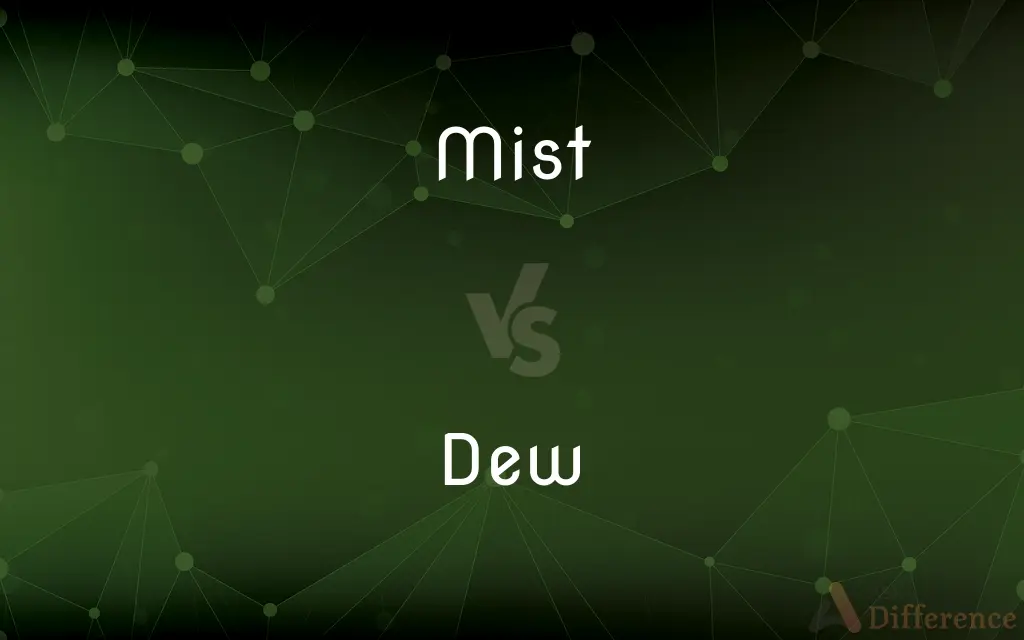Mist vs. Dew — What's the Difference?
By Tayyaba Rehman & Urooj Arif — Published on February 1, 2024
Mist is fine droplets of water suspended in the air, while dew forms as droplets on cool surfaces near the ground.

Difference Between Mist and Dew
Table of Contents
ADVERTISEMENT
Key Differences
Mist is a weather phenomenon consisting of tiny water droplets suspended in the air, reducing visibility. Dew forms when water vapor condenses on cool surfaces near the ground, creating droplets.
Mist can envelop landscapes, creating a soft, ethereal quality that obscures details. Dew, in contrast, delicately beads on surfaces like grass, spider webs, and leaves, accentuating their textures.
Mist often occurs when moist air cools, leading to the condensation of water vapor in the air. Dew forms through a similar cooling process, but it requires a solid surface upon which water vapor can condense.
Mist is typically observed in areas with high humidity and cooler temperatures, such as river valleys and mountains. Dew is more dependent on clear, calm nights that allow surfaces to cool below the dew point.
Mist can influence the overall climate and ecosystem by contributing to the moisture level in the air. Dew plays a crucial role in providing moisture directly to plants and soil, especially in arid regions.
ADVERTISEMENT
Comparison Chart
Formation
Suspended water droplets in air
Water droplets on surfaces
Visibility Impact
Reduces visibility
No impact on visibility
Location
In the air
On solid surfaces
Weather Conditions
High humidity, cooler air
Clear, calm nights, cool surfaces
Ecological Impact
Adds moisture to air
Provides moisture to plants/soil
Compare with Definitions
Mist
Mist forms from tiny water droplets in the air.
As we ascended the mountain, we were enveloped by a cool mist.
Dew
Dew forms when the surface temperature drops below the dew point.
As the metal cooled, dew began to form on its surface.
Mist
A mass of fine droplets of water in the atmosphere near or in contact with the earth.
Dew
Dew provides essential moisture in arid climates.
In the desert, plants rely heavily on dew for moisture.
Mist
Water vapor condensed on and clouding the appearance of a surface.
Dew
Water droplets condensed from the air, usually at night, onto cool surfaces.
Mist
A suspension of fine drops of a liquid in a gas.
Dew
Something moist, fresh, pure, or renewing
"The timely dew of sleep / ... inclines / Our eye-lids" (John Milton).
Mist
To moisturize (plants or dry air, for example) with a fine spray of water.
Dew
Moisture, as in the form of tears or perspiration, that appears in small drops.
Mist
To spray fine droplets on, particularly of water.
I mist my tropical plants every morning.
Dew
To wet with or as if with dew.
Mist
To disperse into a mist, accompanying operation of equipment at high speeds.
Dew
(uncountable) Any moisture from the atmosphere condensed by cool bodies upon their surfaces.
Mist
Coarse, watery vapor, floating or falling in visible particles, approaching the form of rain; as, Scotch mist.
Dew
(uncountable) Moisture in the air that settles on plants, etc in the morning or evening, resulting in drops.
Mist
Mist can create a veil-like effect, obscuring views.
The mist obscured the view of the valley below.
Dew
An instance of such moisture settling on plants, etc.
There was a heavy dew this morning.
Mist
Mist enhances the atmosphere's moisture content.
The mist added a refreshing moisture to the dry air.
Dew
(figurative) Anything that falls lightly and in a refreshing manner.
Mist
Fine drops of a liquid, such as water, perfume, or medication, sprayed into the air.
Dew
(figurative) An emblem of morning, or fresh vigour.
Mist
Something that dims or conceals.
Dew
To wet with, or as if with, dew; to moisten.
Mist
A haze before the eyes that blurs the vision.
Dew
Moisture from the atmosphere condensed by cool bodies upon their surfaces, particularly at night.
Her tears fell with the dews at even.
Mist
Something that produces or gives the impression of dimness or obscurity
The mists of the past.
Dew
Figuratively, anything which falls lightly and in a refreshing manner.
Mist
A drink consisting of a liquor served over cracked ice.
Dew
An emblem of morning, or fresh vigor.
Mist
To be or become obscured or blurred by or as if by mist.
Dew
To wet with dew or as with dew; to bedew; to moisten; as with dew.
The grasses grewA little ranker since they dewed them so.
Mist
To rain in a fine shower.
Dew
Same as Due, or Duty.
Mist
To conceal or veil with or as if with mist.
Dew
Water that has condensed on a cool surface overnight from water vapor in the air;
In the morning the grass was wet with dew
Mist
Water or other liquid finely suspended in air. fog, haze.}}
It was difficult to see through the morning mist.
Dew
Dew droplets can reflect the morning light.
The dew on the leaves sparkled like diamonds in the sunlight.
Mist
(countable) A layer of fine droplets or particles.
There was an oily mist on the lens.
Dew
Dew forms as moisture condenses on cool surfaces.
Morning dew glistened on the spider web.
Mist
(figurative) Anything that dims, darkens, or hinders vision.
Dew
Dew is most apparent at dawn, after a cool night.
The grass was covered in dew as the sun rose.
Mist
To form mist.
It's misting this morning.
Mist
To cover with a mist.
The lens was misted.
Mist
(of the eyes) To be covered by tears.
My eyes misted when I remembered what had happened.
Mist
Visible watery vapor suspended in the atmosphere, at or near the surface of the earth; fog.
Mist
Hence, anything which dims or darkens, and obscures or intercepts vision.
His passion cast a mist before his sense.
Mist
To cloud; to cover with mist; to dim.
Mist
To rain in very fine drops; as, it mists.
Mist
A thin fog with condensation near the ground
Mist
Become covered with mist;
The windshield misted over
Mist
Make less visible or unclear;
The stars are obscured by the clouds
Mist
Spray finely or cover with mist
Mist
Mist is a thin fog with visibility greater than 1 kilometer.
The mist over the lake gave the morning a mystical feel.
Mist
Mist is common in moist, cool environments.
The forest was often shrouded in mist in the early morning.
Common Curiosities
What is mist?
Mist is composed of fine water droplets suspended in the air, often reducing visibility.
Does mist affect driving?
Yes, mist can reduce visibility, making driving conditions more hazardous.
Can mist be artificially created?
Yes, mist can be created using misting systems for cooling or agricultural purposes.
How does dew form?
Dew forms when water vapor condenses on cool surfaces during calm, clear nights.
What time of day is mist most common?
Mist is commonly seen in the early morning or evening when temperatures drop.
How is dew useful to plants?
Dew provides moisture directly to plants, which can be crucial in dry environments.
Does mist contribute to rainfall?
Mist itself doesn't contribute directly to rainfall, but it indicates high humidity.
Can mist occur indoors?
Yes, mist can form in large indoor spaces like warehouses if conditions are right.
How long does dew last?
Dew typically evaporates shortly after sunrise as temperatures rise.
What affects dew formation?
Factors like surface temperature, air temperature, and humidity affect dew formation.
Is dew only found on plants?
No, dew can form on any cool surface, including cars, windows, and ground.
Is dew a sign of good weather?
Dew often indicates clear skies and stable weather conditions overnight.
Is dew drinkable?
While technically drinkable, dew is not a practical or significant source of water for humans.
Can dew freeze?
Yes, when temperatures are below freezing, dew can form as frost.
Can mist occur without fog?
Yes, mist can occur without fog, especially in areas with high humidity and temperature gradients.
Share Your Discovery

Previous Comparison
Microwave Oven vs. Conventional Oven
Next Comparison
Bearded Collie vs. Old English SheepdogAuthor Spotlight
Written by
Tayyaba RehmanTayyaba Rehman is a distinguished writer, currently serving as a primary contributor to askdifference.com. As a researcher in semantics and etymology, Tayyaba's passion for the complexity of languages and their distinctions has found a perfect home on the platform. Tayyaba delves into the intricacies of language, distinguishing between commonly confused words and phrases, thereby providing clarity for readers worldwide.
Co-written by
Urooj ArifUrooj is a skilled content writer at Ask Difference, known for her exceptional ability to simplify complex topics into engaging and informative content. With a passion for research and a flair for clear, concise writing, she consistently delivers articles that resonate with our diverse audience.
















































